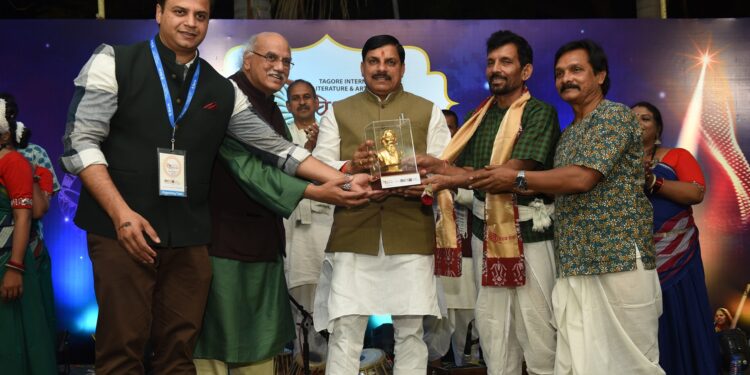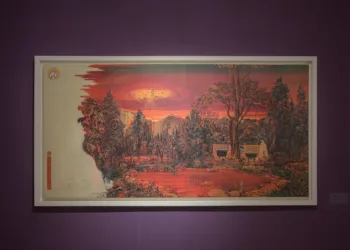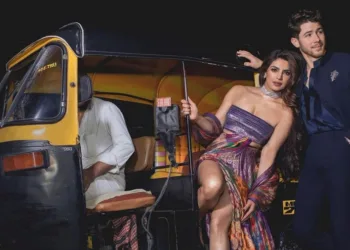Bhopal, 17 Nov 2022: The third day of ‘Kala Mahotsav’ under ‘Vishwarang’, an international arts and literature festival, began with the ‘Challenges of Art Criticism’ session. The panel discussion saw the participation of renowned art critic and poet Prayag Shukla, film and art critic Vinod Bhardwaj, film producer-director & critic Sudeep Sohni and famous painter Ashok Bhowmik. Well-known film and theatre critic and senior print and TV journalist Ravindra Tripathi chaired the session.
Tripathi focused on the need for art critics. He further said, “It is vital to write passionately about art. It is also necessary to have a mutual dialogue between the artist and the critics.” Taking the conversation forward, Prayag Shukla said that art review is an internal dialogue. He also urged the reviewers to have an interest in all art forms. While speaking about film reviews, Sohni commented every art form is ultimately poetry.
Ashok Bhowmick added value to the discussion with his words of wisdom. Focusing on painting, he said art needs to be experienced, not understood, just as we enjoy watching the sunset. We should not try to understand it.” At the end of the session, the Chancellor of Rabindranath Tagore University (RNTU), Santosh Choubey, also talked about the technology’s role in art review and criticism. He further said one should not separate the artwork from its context.
Art critic Vinay Upadhyay moderated the panel discussion. Summing up all the ideas and points of the session, Upadhyay said, “One cannot review the sea waves while sitting on the shore. One must drench himself in the waves first.”
Another thought-provoking session was on the “Unseen Role of the Accompanists”. Renowned Tabla player Padmashree Pandit Vijay Ghate, Kathak dancer and choreographer Shama Bhate, art writer Chitra Sharma and art critic Vinay Upadhyay expressed their views in the panel discussion. During the session, a remarkable performance highlighted the symphony and creative combination between the Tabla rhythms and Kathak steps. Vinay Upadhyay said that accompaniment is an essential component in music and dance. But the need is to acknowledge its due importance. Chitra Sharma quoted Kathak’s combinations in which rhythm (Lay and Taal in Hindi) hold utmost importance. Chitra Sharma’s book on kathak was also unveiled.
Musical Presentation of Habib Tanvir’s Songs
The cultural evening began with Purva Rang, where Naya Theater Group’s Dhannulal Sinha and his team performed ‘Rang Sangeet.’ The power-packed musical performance included songs from famous plays of Habib Tanvir, interweaving traditional tunes and folk music. The show began with “Aama Ke Dara Lahsani Sua Ban Ke Aaja, Maina Ban Ke Aaja…” from the movie Charandas Chor. After this, the group sang “Batao Gumnami Achhi Hai Ya Achhi Hai Naamvari…” from the play Thehalaram, “Sanjha Bera Javo Ghumela Domri, Isan Sapna Sapnae Ho Jodi…” from the play Bahadur Kalarin, “Dekh Tu Bahini Aavat Hare Chor…” from the play Charandas Chor. Taking the program forward, he presented the song “Duniya Mein Nayi Hai Raja Hamar Asan Sukhiyaar…” from Natak Dekh Rahe Nain on tunes of Chhota Nagpur.
Singer Ram Chandra Singh, Sangeeta Sinha and Parul Singh accompanied Dhannulal Sinha. Meanwhile, Amar Singh Gandharva on Harmonium, Ram Sharan Vaishthav on Tabla, Vinod Tekam on Dholak, and Manharan Gandharva on Manjira, were also present. While Priyamvada Sinha and Payal Singh were in the chorus, Sheetal Ghughe, Radhika Gandharva, Satish Vyam, Neeraj Shyam, Anmol Shyam, Angad, Faroz, Khilna Sinha assisted the group.
‘Bandishen’: A story of an artist’s struggle
How do artists deal with all the pressure on them? What struggles does an artist face? What restrictions hamper an artist, and how does one overcome them? The theatrical presentation Bandish 20–20000 Hz presented its perspective on these questions through singing.
The play begins with the 70th Independence day celebration, hosted by a political leader in his constituency. He has invited a few singers to honour them and to sing. One of them is Champa Bai, and the other is Beni Bai. While the former is a Nautanki singer, the latter is a courtesan known for her classical music. Both of them do not have to sing in this program. Champa Bai wants to sing, but an officer stops her. He further tells her that folk artists of the old era will only be honoured here. Meanwhile, Beni Bai does not want to sing because she had taken a vow not to do so years ago.
The organisers have invited modern singers Moushumi and Kabir to sing at the event. However, Kabir is facing an uproar on social media for his song, which originated in the neighbouring country. If he sings, chances are that he might face a revolt, leading to an administration’s headache. But Kabir is unaffected by the situation. He asks for double the remuneration for not singing. After a lot of negotiation, the administration agrees to his wish. The difficulty with Moushumi is that the track of her songs has not arrived with other stuff. Because of this, she can’t perform. Now, the crisis is leading to a show for audience without any artists! The entire play revolves around it.
On The Stage
Anubhav Fatehpuria, Harsh Khurana, Hitesh Bhojraj, Nivedita Bhargava, Rajiv Kumar, Monika Gupta, Shweta Deshpande, Kriti Saxena, Yash Khan, Varun Gupta, Sheetal Sharma
Behind The Stage
Director & Writer – Purva Naresh, Music – Shubha Mudgal, Lights – Asmit Pathare, Harmonium – Purab Jagat, Tabla & Dholak – Varun Gupta, Set – Manish Kansara, Research – Shubha Mudgal, Anish Pradhan, Atul Tiwari, Priyamvada








